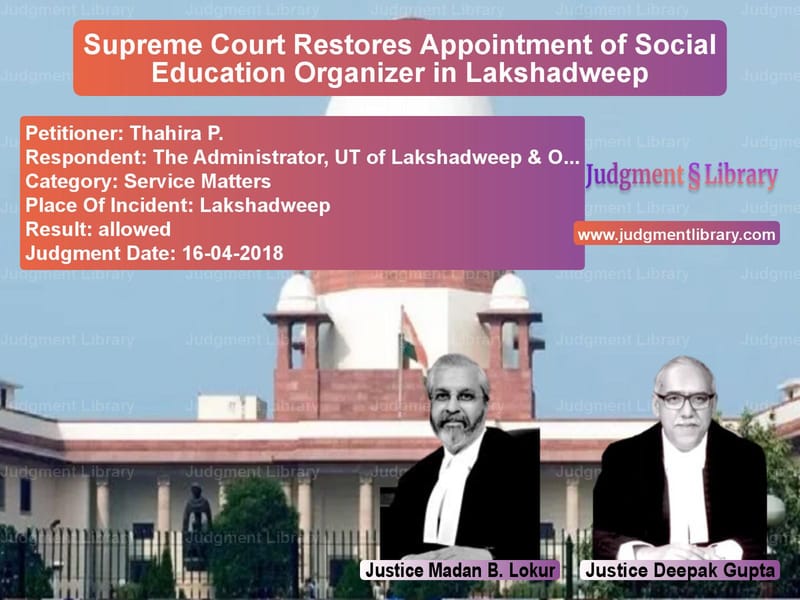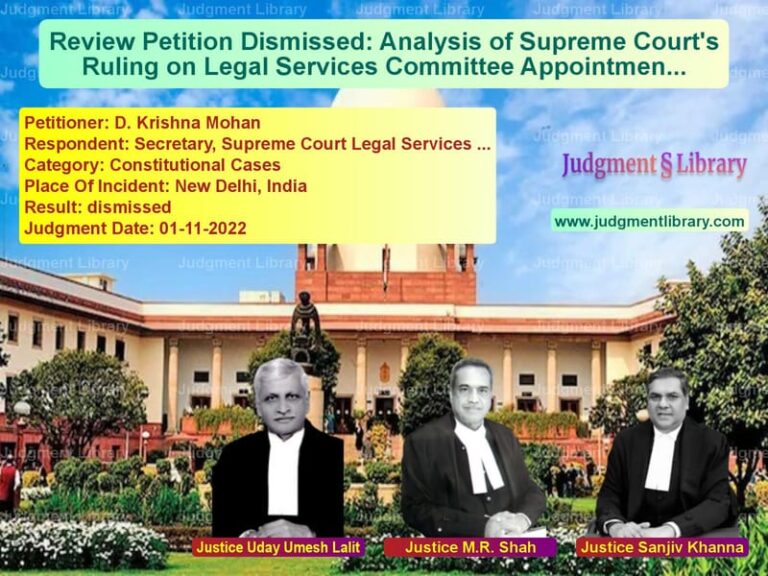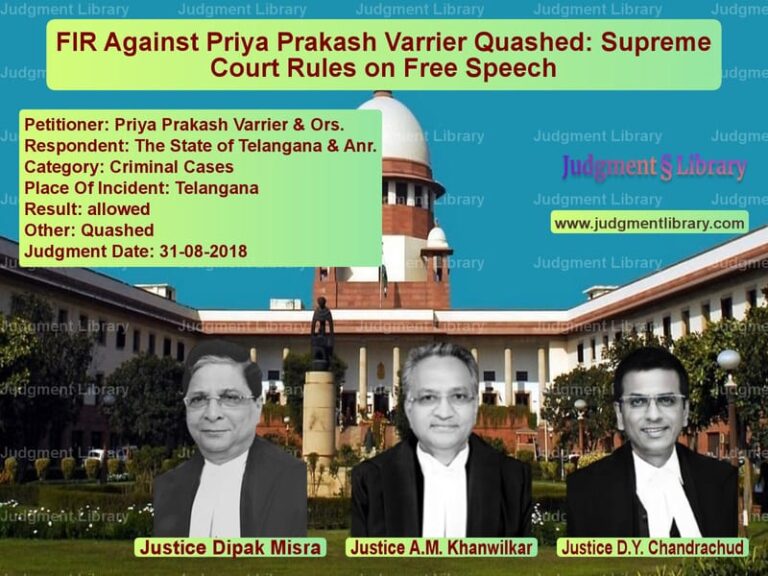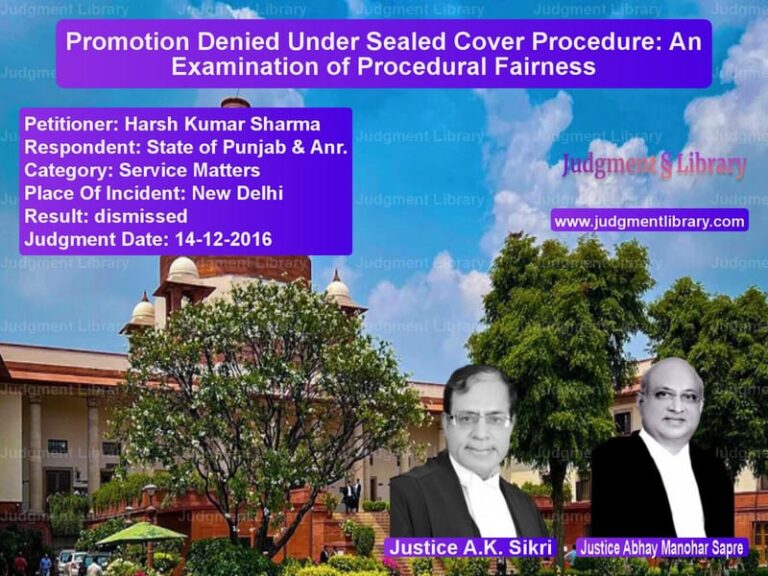Supreme Court Restores Appointment of Social Education Organizer in Lakshadweep
The Supreme Court of India recently ruled on a significant case regarding public employment and the validity of appointments in the case of Thahira P. v. The Administrator, UT of Lakshadweep & Ors.. The Court set aside the decisions of the Central Administrative Tribunal (CAT) and the Kerala High Court, thereby restoring the appointment of the petitioner, Thahira P., to the post of Social Education Organizer in Lakshadweep.
Background of the Case
The dispute arose from a recruitment process conducted by the Directorate of Education, Union Territory of Lakshadweep. The Administration issued an advertisement inviting applications from local candidates for the post of Social Education Organizer. The eligibility criteria specified that candidates must possess a Bachelor’s degree in Sociology from a recognized university.
Key Facts:
- Thahira applied for the post, possessing a B.A. in Malayalam and Sociology (Double Main) from the University of Calicut.
- Kadeeja, the fourth respondent, also applied, holding a B.A. in Sociology (Single Main) from the same university.
- On May 24, 2011, the Administration published a check-list ranking the applicants based on their marks:
- Thahira secured 48.03% and was ranked first.
- Kadeeja secured 46.43% and was ranked second.
- The check-list stated that Sociology would carry 85% weightage, Bachelor of Social Work (BSW) 5%, and Master of Social Work (MSW) 10%.
- Applicants were given until May 26, 2011, to raise objections to the check-list.
- On June 4, 2011, the final rank list was published, confirming Thahira’s first rank.
- On June 7, 2011, Thahira was appointed on a temporary basis.
Challenges to the Appointment
After the final list was published, Kadeeja challenged Thahira’s selection on the grounds that her degree in Malayalam and Sociology (Double Main) was not equivalent to a degree in Sociology (Single Main).
Key Legal Challenges:
- On May 27, 2011—after the deadline—Kadeeja filed an objection alleging that Thahira’s qualification was not eligible.
- The Administration dismissed her objection as being time-barred.
- Despite this, Kadeeja approached the Central Administrative Tribunal (CAT) on July 18, 2013, challenging Thahira’s appointment.
- The CAT ruled in Kadeeja’s favor, holding that her marks should be re-evaluated, thereby invalidating Thahira’s appointment.
- Thahira challenged this ruling in the Kerala High Court, which upheld the CAT’s decision.
Supreme Court’s Observations
The Supreme Court examined the case from multiple angles and made the following key observations:
- “The issue of equivalence between Double Main and Single Main degrees is purely an academic matter, best left to the University.”
- “The University of Calicut officially confirmed on May 9, 2016, that a B.A. in Malayalam and Sociology (Double Main) is equivalent to a B.A. in Sociology (Single Main). This confirmation settles the eligibility dispute.”
- “The challenge raised by Kadeeja was time-barred as objections were allowed only until May 26, 2011. The Administration was right in rejecting it.”
- “Courts should not interfere in selection processes unless there is a clear violation of law. Re-evaluating marks was beyond the High Court’s jurisdiction.”
Final Judgment
The Supreme Court set aside the orders of the CAT and the Kerala High Court, restoring Thahira’s appointment. The Court ruled:
“The Tribunal and the High Court needlessly opened up a new avenue for challenging the appointment. The objection was time-barred, and the University’s clarification confirms Thahira’s eligibility.”
As a result, Thahira’s appointment was reinstated, and Kadeeja’s claim was rejected.
Significance of the Judgment
This ruling is a landmark decision reinforcing the following principles:
- Judicial Restraint in Administrative Matters: Courts should not interfere in academic and administrative decisions unless a clear legal violation is established.
- Strict Adherence to Timelines: Candidates must adhere to deadlines for filing objections. Delayed objections should not be entertained.
- University’s Authority on Academic Equivalence: Courts should rely on university decisions regarding academic qualifications.
- Stability in Public Employment: Once appointments are finalized, they should not be disturbed without compelling reasons.
Conclusion
The Supreme Court’s ruling in this case upholds the integrity of recruitment processes and reinforces the need for procedural fairness. By reinstating Thahira’s appointment, the Court has provided clarity on how academic qualifications should be assessed and ensured that administrative authorities have the final say in evaluating eligibility. This judgment serves as a vital precedent for future disputes in public employment.
Petitioner Name: Thahira P..Respondent Name: The Administrator, UT of Lakshadweep & Ors..Judgment By: Justice Madan B. Lokur, Justice Deepak Gupta.Place Of Incident: Lakshadweep.Judgment Date: 16-04-2018.
Don’t miss out on the full details! Download the complete judgment in PDF format below and gain valuable insights instantly!
Download Judgment: Thahira P. vs The Administrator, U Supreme Court of India Judgment Dated 16-04-2018.pdf
Direct Downlaod Judgment: Direct downlaod this Judgment
See all petitions in Recruitment Policies
See all petitions in Public Sector Employees
See all petitions in Employment Disputes
See all petitions in Judgment by Madan B. Lokur
See all petitions in Judgment by Deepak Gupta
See all petitions in allowed
See all petitions in supreme court of India judgments April 2018
See all petitions in 2018 judgments
See all posts in Service Matters Category
See all allowed petitions in Service Matters Category
See all Dismissed petitions in Service Matters Category
See all partially allowed petitions in Service Matters Category







